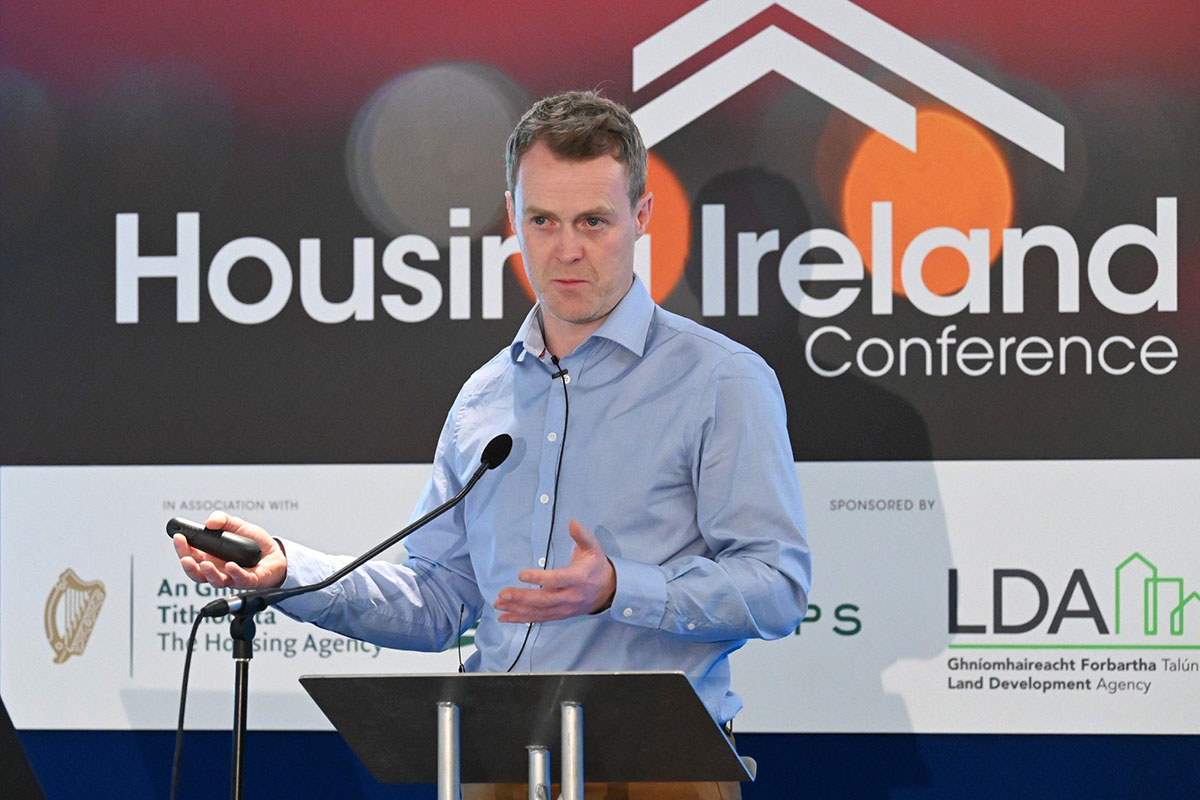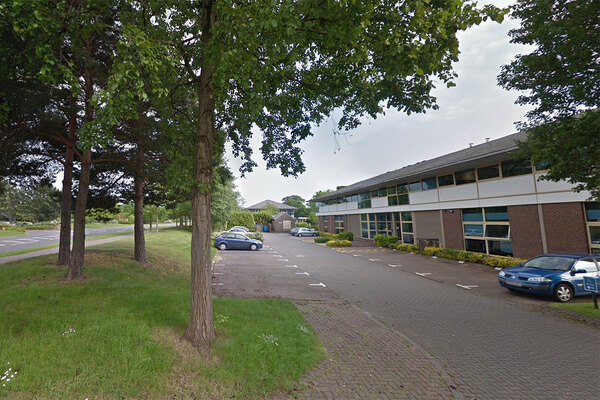Northern Ireland’s power-sharing government is back. How does Seamus Leheny aim to get housing on the agenda?
Seamus Leheny took over as chief executive of the Northern Ireland Federation of Housing Associations just over a year ago. He explains his strategy to Grainne Cuffe

It is clear when I walk into Seamus Leheny’s office that he means business. Top priority for the chief executive of the Northern Ireland Federation of Housing Associations (NIFHA) is the delivery of new social housing and doing everything he can to get more funding for it.
With waiting lists for social housing hitting 46,461 last year – an increase of more than 10,000 since 2017-18 – his job is to lobby for a product that is more urgently needed than ever. Some of his plans are immediately obvious – a list of the party conferences are pinned to a board in his office. At the time of speaking, he had been to two already: DUP and Sinn Féin. The deal to return to power-sharing was agreed just days after we spoke, which could help with progress on delivery.
Pointing to the list of conferences, he says: “I want to go to all five this year. For the first ever time, we’ve got a housing fringe session at the Alliance Party Conference.
“I will be asking all of them to do it. I want a hustings event for the Westminster election.
“It’s about just getting out there with politicians, because we’ve got a great opportunity where housing is on the political agenda. We’re starting to see the need for it, the benefits of it. It’s about sitting down and educating people.”
It is clear he means business when it comes to coffee, too – he pours me a delicious, fresh cup with the words: “My heart sinks when I see people take out the instant.”
Mr Leheny has been in the job for just over a year, but sorting out a decent cup of coffee is probably the easiest challenge he has had to face.
Last year, associations exceeded housing targets set by the government, with 1,449 completions and 1,956 starts. But this year, they do not expect targets to be met without more funding. With growing numbers in temporary accommodation and huge waiting lists, who is NIFHA’s chief executive and how is he setting about lobbying for the sector and new social homes?
Largest landlord in Northern Ireland
It is a cloudless day in January and the view of Divis and the Black Mountain is beautiful – NIFHA might be located on a business park, but the backdrop is stunning. As Mr Leheny points out, the view also tells a story about social housing in Northern Ireland – a tall social housing block to the left, built in the 1960s and owned by the Northern Ireland Housing Executive (NIHE), and much newer houses to the right, owned by housing association Clanmil.
The NIHE was set up in 1971 to manage social homes after councils were deemed biased in their allocations, with favour given to Protestants. Opposition to this was a major issue for the Northern Ireland civil rights movement in the 1960s.
The NIHE is still by far the largest social landlord in the county with around 85,000 homes, but it stopped building more than 20 years ago (until a small pilot, which broke ground in December 2023). NIFHA’s members, made up of 20 housing associations, are the main developers of social housing in the country – 59,000 homes and counting.
I am speaking to Mr Leheny, who has been in the post of chief executive since December 2022, the day after NIFHA’s Housing Development and Asset Management Conference. He has arguably the perfect experience for the job, thanks to a career that has centred on policy work and lobbying. Born in Buncrana in Donegal, in the Republic of Ireland, he left to go to the University of Dundee in Scotland. He then moved to Belfast, where he has lived for 22 years.
Mr Leheny’s first job out of university was working at the BBC in the capital, dealing with general enquiries and complaints. From there, he started working in the shipping sector after being taken on as part of a graduate recruitment programme.
“It was really for the commercial element, I kind of fell into it, stuck at it for a while, and was then recruited into policy work,” he says. Mr Leheny joined what was then called the UK-based Freight Transport Association, now Logistics UK, as manager for Northern Ireland. “I worked my way up there and managed Northern Ireland and Scotland on policy and dealt a lot with Brexit. Brexit was… intense.
“I had a lot of trips to London and Brussels. What you see today, the whole protocol, the Windsor framework, we were basically educating politicians, ministers, advisors about supply chain north and south, and east and west.”
Mr Leheny has worked directly with deputy heads and heads of state: Micheál Martin, Leo Varadkar, Theresa May, Liz Truss. He also worked with the US government and two years ago, was invited to the White House on
St Patrick’s Day to meet president Joe Biden.
“It was a nice little gesture, but for me personally it was a nice thing, an acknowledgment that I must have been doing something right,” Mr Leheny says. He smiles as he shows me a mug with a photo of him and President Biden on it – a present he received when he left Logistics UK.
What spurred the transition into housing? “I was doing that for about 12 years and I wanted a challenge. I’d been working for the private sector all that time and I always had an ambition to go into the third sector working for not-for-profit charities.
Northern Ireland in numbers
46,461
Households on the housing waiting list as of December 2023
4,556
Households living in temporary accommodation as of January 2024
3,910
Households presenting as homeless to the Northern Ireland Housing Executive between October and December 2023
1,956
Housing association starts in 2022-23
1,449
Housing association completions in 2022-23
1,400
Expected number of completions for 2023-24
2,200
Required competitions per year to put a dent in the housing waiting list
“So, when I saw this position, it was something I leapt at – policy work is policy work no matter what sector it is. What appealed to me was the social aspect of the housing sector, what it delivers. You get to a point in your career where you want to do something that’s making a difference.”
His experience will no doubt be invaluable for that. “People didn’t understand supply chains before Brexit and COVID-19.
“My role was to sit and educate politicians and civil servants about the impacts of, let’s say, the legislative implication Brexit would have on the ability to get goods to supermarkets or factories, and that kind of worked.
“It’s the same with housing. I want to just work with those politicians – a lot of them are on the ball, there are some politicians here who are absolutely brilliant, they know this stuff. But there are others… you’ve got to demystify it.”
Mr Leheny and I spoke just days before the government got back up and running after nearly two years of deadlock over the Northern Ireland protocol.
“I want to just work with those politicians – a lot of them are on the ball, there are some politicians here who are absolutely brilliant, they know this stuff. But there are others… you’ve got to demystify it”
What are the challenges that lie ahead for housing associations in Northern Ireland?
“Funding is a problem. The unique funding model for Northern Ireland [means] we can’t go out to the private markets and borrow more than what we get from the government on the Social Housing Development Programme. There are over 45,000 applications on the waiting list here. If we want to make a serious dent in that, we need to be building minimum 2,200 homes a year. This year, we’re probably going to deliver about 1,400 homes. There’s quite a significant gap and that’s not due to lack of appetite, willingness or ability. It’s simply just due to the funding.”
Mr Leheny raised significant concerns about a lack of funding for the Supporting People programme, which supports residents to live independently. Since then, the lobbying efforts of NIFHA and other housing bodies have come to fruition, as communities minister Gordon Lyons announced an extra £3m for the programme.
“Again, it’s this education piece – we’ve been saying if housing associations were to withdraw or not be able to provide [Supporting People], the costs incurred on health trusts would be a lot greater,” he says.
Decarbonisation plans
Another major issue is decarbonisation. The devolved nation gets money through the Barnett formula when Westminster allocates funding to the Social Housing Decarbonisation Fund, but it is not ringfenced.
Then Mr Leheny adds that construction companies are going elsewhere because there is less work available in Northern Ireland.
“A lot of the skills and expertise are either driving down the M1 to Dublin to do work, or they’re getting on planes every Monday morning and working in London and Birmingham during the week. We’ve got to get those workers back here.
“If someone turned and magically came up with a pot of money tomorrow, and said, ‘Start retrofitting houses,’ we couldn’t just turn it on instantly because the supply chain just isn’t in position. You need the goods, materials and the labour to do that. It needs to be a gradual turning-on of the tap.”
This all needs a government willing to supply the funds. Communities minister Mr Lyons has since said one of his priorities is to build more social homes.
At the time of our chat, Mr Leheny said: “We need a minister who realises the challenges” social housing providers are facing. And now? “Mr Lyons has been on the ground in the early days of his tenure as minister with members. He’s been talking very positively about the need to build more social and affordable homes.”
But he says money could be a problem. “We need action to back up his words from the wider Northern Ireland executive. So far, so good. It’s early days, but it’s encouraging to see a minister who gets it.”
The allocations system in Northern Ireland is currently undergoing a major overhaul. Mr Leheny says there are still issues that need to be addressed, for example, households getting additional points when awarded intimidation points. Intimidation points are awarded to people if their safety is at risk.
“If someone turned and magically came up with a pot of money tomorrow, and said, ‘Start retrofitting houses,’ we couldn’t just turn it on instantly because the supply chain just isn’t in position”
“I’ve had examples of some of our members where half the new tenants [who have been] moved into a new development are there based on intimidation points. That doesn’t create a sustainable tenancy because you’re bringing [a significant percentage] of people who may have issues.”
He says this could be addressed by transferring people with intimidation points to developments that have already bedded in when properties become available.
“Then you spread it, rather than putting [them] all in one place,” he says.
On tackling net zero, housing associations are not in a bad position – 73% of their homes have an Energy Performance Certificate rating of Band C and above. Mr Leheny would like all those that are below C – around 12,000 – retrofitted in the next decade.
What is his ideal day when he is not working? A “good cup of coffee”, nice food and a run. He has run several marathons.
But even on his time off, he is on the job. “Sometimes you get your best ideas if you go for a run. Sometimes you’re just out there and you just get these ideas and you can’t wait to get home to write them down.”
The ideas are clearly flowing – and there are at least 46,000 reasons to hope Mr Leheny has come up with the right answers.
Recent longform articles by Grainne Cuffe
The first year of tenant satisfaction measures: the results
Government overhauled consumer regulation following Grenfell. Now, an Inside Housing survey of more than 200 councils and housing associations reveals the first results from the new TSMs regime. Grainne Cuffe investigates
Awaab’s Law: how it could challenge and change the sector
The consultation is out for Awaab’s Law, setting time limits for English social landlords on responding to repairs that pose a hazard to tenants. But what exactly is in the proposals? Grainne Cuffe reports
Homeless and on hold: the battle to get support from councils
Being threatened with homelessness is stressful enough. But, in some council areas, the process of getting support from the council is making things harder. Grainne Cuffe reports
Housing officers under pressure
Grainne Cuffe talks to housing officers about the stress of their jobs, as Inside Housing reveals that turnover in some frontline roles has risen dramatically
Sign up for our Northern Ireland bulletin
Already have an account? Click here to manage your newsletters













